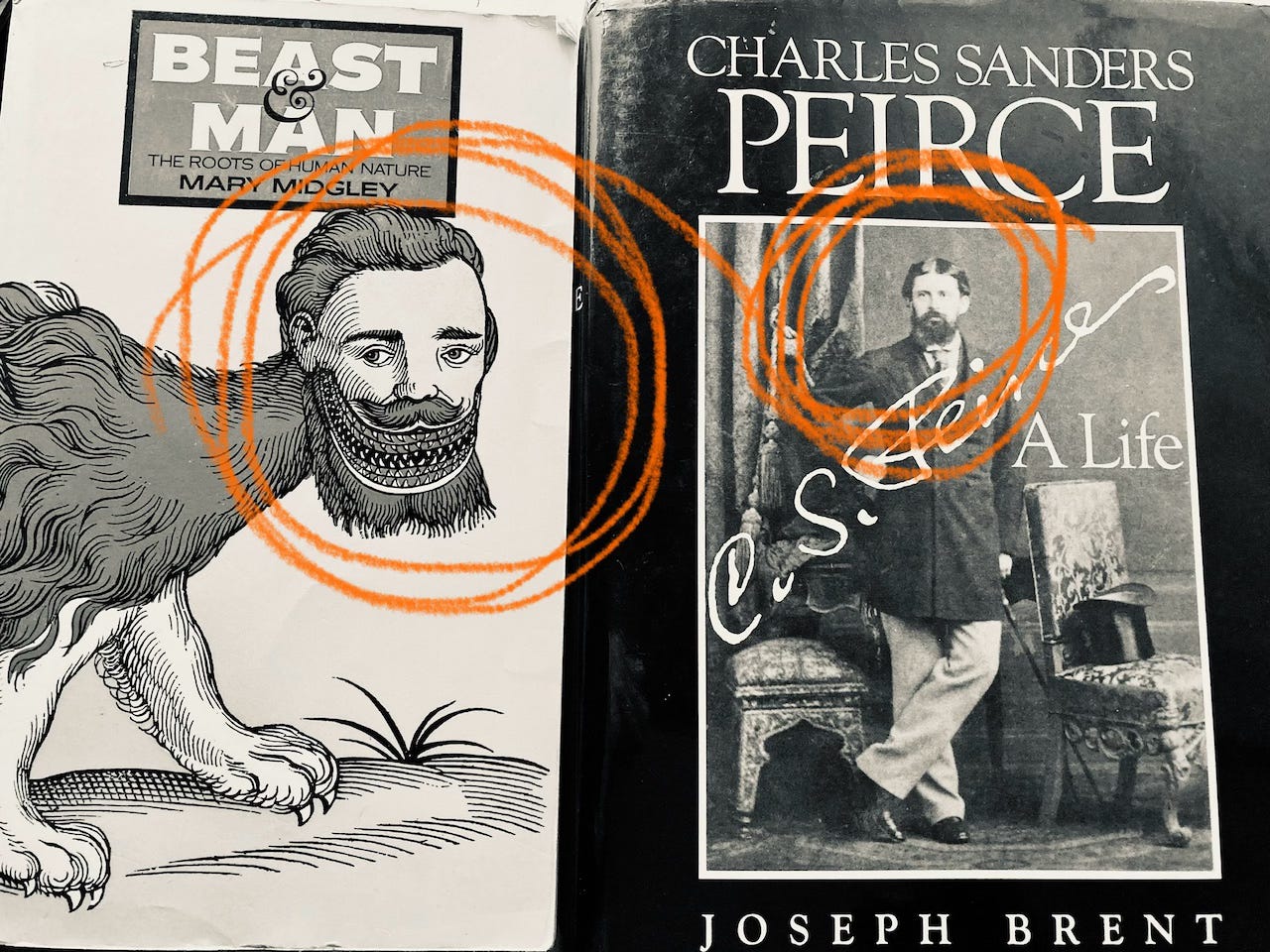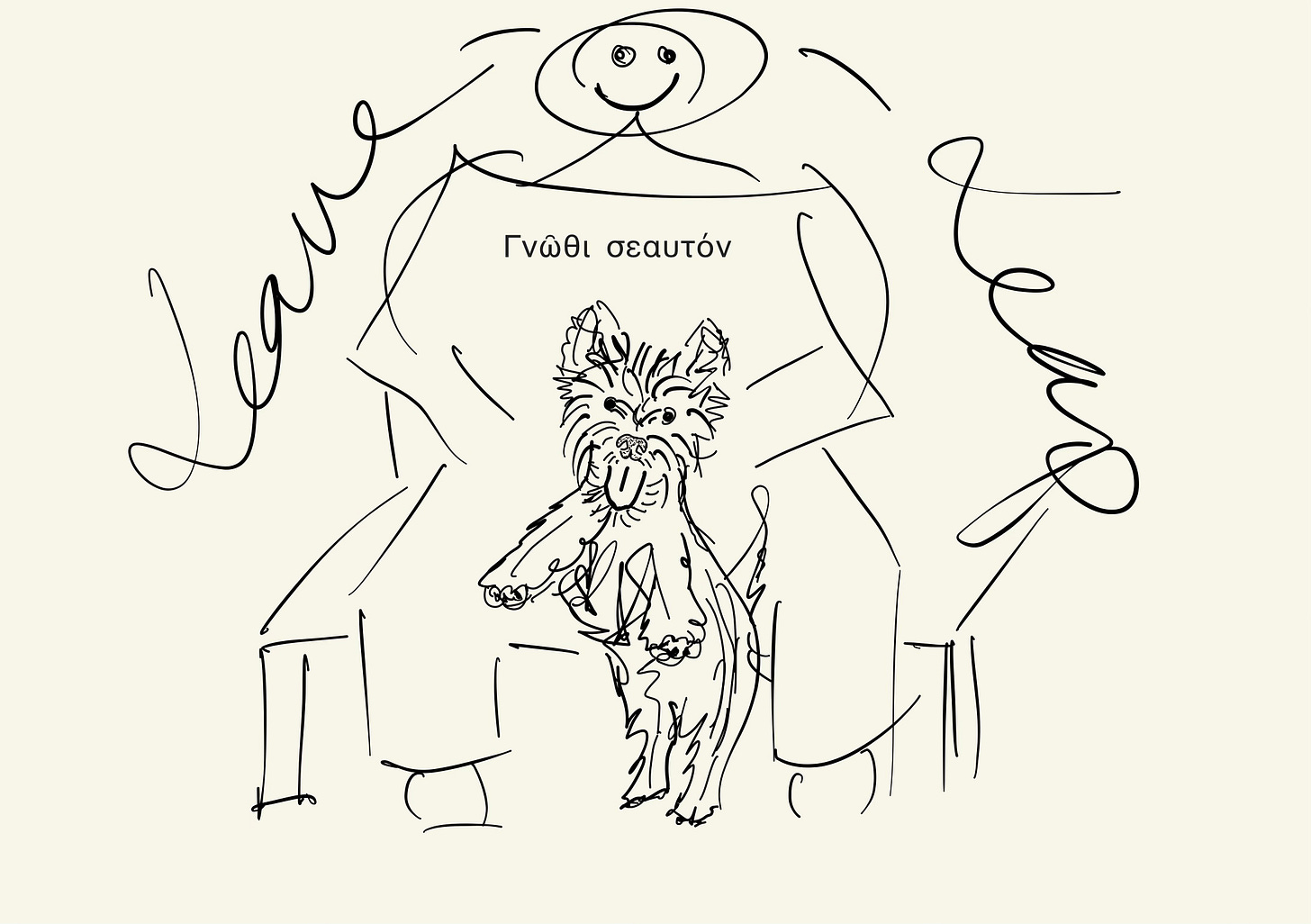I have often wondered whether the philosophers I like would get along if they were ever to meet. This is not just complicated by the fact that I like (mostly dead) philosophers from different periods, who happen to have been more … let’s say “fringy”. Also, one of my favourite philosophers - Charles Sanders Peirce - is almost famous for how abrasive he must have been; he had a pretty low, but apparently accurate opinion of himself. Then again, there is little my imagination won’t allow for. So, let’s go there.
Follow me. We are going to a conference. I know, it’s a bright sunny day, no other animals than humans would hide inside; perhaps moles. Snails! Rainworms. Woodlice, bats. Gigantocypris … oh, looks like we are in good company. This way. Old building. Many great minds have been here. Damn it, we are a little late. Mary Midgley is in the middle of giving a talk. Just be silent, over here. There are a few empty seats. She looks up from her notes. Doesn’t recognise me. How could she, we have never met. Did you know that apparently, if you come for a supervision with her, she offers you biscuits? Ay. I shall be silent myself as well. Sorry.
Midgley is in the middle of a talk on human nature. I like her work on the topic. Perhaps a bit dated as far as the ethology is concerned ... Sorry! Later. Okay, okay.
Her point: In understanding humankind, a researcher must “look at its behaviour impartially first and then search for causes and connections. He will find this easiest if he is not a human himself, but is a member of another species coming here as an observer. So we will take him to come from Alpha Centauri, and call him for short the Centaur. This Centaur has at his command hundreds of years of observations on Homo sapiens.”1
I notice how the guy a few seats next to me is frantically taking notes. Crazy old-school handwriting. Now he writes, in capital letters: “ALIENS!” - and underscores it, like three or four times. Could this … be? Oh! I am not going to say anything, but I open a book (by Midgley) and write a note to you: “Peirce!”
I mean the guy, next to me.
Here is a quote from him I always really liked: “[…], just as we say that a body is in motion, and not that motion is in a body we ought to say that we are in thought and not that thoughts are in us.” You look a bit puzzled. Later!
Oh, good. It’s already time for Q&A. The guy, perhaps Peirce, exhales slightly exasperated as the first question is given to a student to ask. Midgley is really very kind to the student.
Now, the guy, probably Peirce: “Thank you. Miss-is … Midgley. Your point about aliens being capable of making scientific observations strikes me as congenial. Though my wish would be to harness these delightful abilities in wholly different ways. Rather than obtaining information about humans - a species clearly headed for extinction - I would suggest to collaborate with these superb reasoners and invite them into our community of inquiry, to see how we, or, at least some of us, could evolve and transcend the human condition. What do you think of that? Or do you consider it justified that we should bother aliens with narcicisstic questions about humankind?”
My heart is racing. That is Peirce. While Midgley is giving a witty answer that satisfies him and amuses the room, I sort my thoughts. Or, I try to orient my mind in the swell of thought that leaves me almost a bit panicky. I want to add something to the discussion. They are both right and wrong at the same time. I agree with Midgley, against Peirce, that humans, in all their peculiarities, virtues and vices, deserve our attention and should not just be abandoned in transhumanist fantasies about extinction and enhancement and what have you. But then I also agree with Peirce, against Midgley, that it would be a real shame to keep the community of inquiry an exclusively human club.
Another thought floats by like seaweed: Peirce not only assumed that he could understand his horse just as well - perhaps even better - than his wife, but that the whole universe was essentially shot through with significance. I resist the current of problems with infinite semiosis. What I want to say is this:
If we are in thought, just as we are in motion, there is no reason why other animals should not also be in thought.
If we are looking for a most insightful account of human nature, we should invite in particular dogs into our community of inquiry.
Just the other day: A dog leapt onto a man’s lap. It was so significant. (I have a feeling the room is not getting me.) Given the context, the man and his wife, decades of a marriage gone silent hung in the home like dusty spider webs, habits of retreat and accommodation, of hope and appreciation, no drama, just the stuff humans do to each other without thinking, without suffering even, still life, still feeling - the thought: perhaps a little dog … to the rescue.
And he leaps. The man approves. The wife does not. But she could know what this is about if she cared to be a bit more human.
I spare you intimate details; my point is: We don’t need to wait for aliens to bother with us to help us understand ourselves better. We have highly skilled anthropologists among us, with not hundreds but millennia of experience, and they are volunteering their observations and interpretations on a daily basis. Sure, not all of them are unbiased - but why do we assume that aliens would not bring their value judgments to the enterprise of interpretation?
Many people already claim to have had animals as their teachers. Think of Jane Goodall and her dog Rusty or the chimpanzee David Greybeard. (As I say that, it seems that Midgley is getting more interested, she scribbles something - but perhaps she is just drawing Peirce as an idea for her book cover.)
Or think of Craig Foster and the octopus! (Now Peirce looks up, strokes his beard, picks up his phone, but I can’t say if he is googling or just checking his Instagram.)
We celebrate just a handful of animals with books and documentaries, but a vast number of them has something to say. We must only look, I mean really look, way more closely, note the tiny gestures, the overt manoeuvres. And listen. All animals do things, when they do things, for a reason. Sometimes, we all just happen to one another. More often than not, there is meaning. So why don’t we welcome these significant others into the philosophical community?
There. I said it. Am I imagining things or do Peirce and Midgley look a bit puzzled? Am I leaping to conclusions? What do you say?
Midgley will publish this thought pretty much verbatim in her Beast & Man, p. 59.







